brand
Sekibo, Obi, others harp on security, leadership for economic prosperity
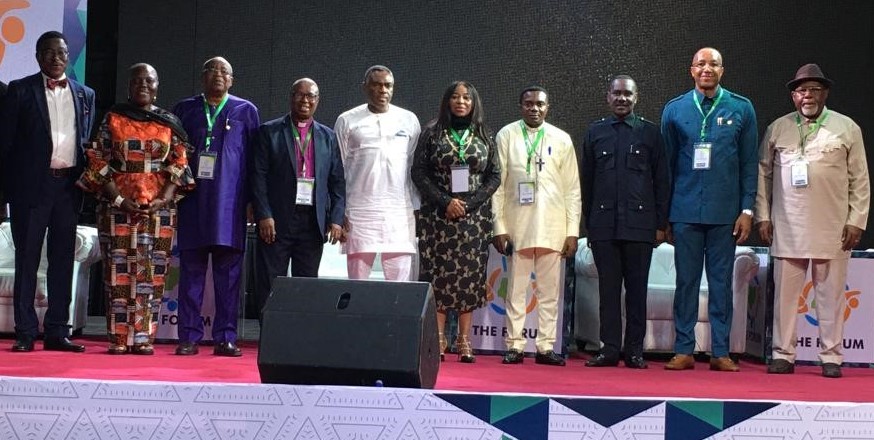
 L-R: Prof. Oyelowo Oyewo; Coordinator of the Nigerian Association of Constitutional Law (NACL); Dr. Oruene Finebone – Secretary, Mediacal Women Association of Nigeria, Rivers State Branch; Barrister Sotonye Inyeinengi-Etomi, President of the Men’s League of Christ Church Port Harcourt; Very Rev. (Dr), Ivan Ekong, Asst. Resident Minister, Christ Church Port Harcourt; Figbene Briggs, Regional Head, South South 1 & 2 Zone; Dr. (Amb.) Victoria Ekhomu, Group MD/CEO of Trans-World Security Systems Ltd.; Very Rev. Jonathan Udofia; Pastor Ituah Ighodalo, Trinity House, International Christian Worship Center; Elder (Engr.) Stanford Tassie and Alabo (Arc) Duboye Donald Graham-Douglas, during the 2nd Edition 2022 Forum, one-day International Colloquium organized by The Men’s League of Christ Church Port Harcourt, tagged, “What do Nigerians Want?”, held in Port Harcourt.
L-R: Prof. Oyelowo Oyewo; Coordinator of the Nigerian Association of Constitutional Law (NACL); Dr. Oruene Finebone – Secretary, Mediacal Women Association of Nigeria, Rivers State Branch; Barrister Sotonye Inyeinengi-Etomi, President of the Men’s League of Christ Church Port Harcourt; Very Rev. (Dr), Ivan Ekong, Asst. Resident Minister, Christ Church Port Harcourt; Figbene Briggs, Regional Head, South South 1 & 2 Zone; Dr. (Amb.) Victoria Ekhomu, Group MD/CEO of Trans-World Security Systems Ltd.; Very Rev. Jonathan Udofia; Pastor Ituah Ighodalo, Trinity House, International Christian Worship Center; Elder (Engr.) Stanford Tassie and Alabo (Arc) Duboye Donald Graham-Douglas, during the 2nd Edition 2022 Forum, one-day International Colloquium organized by The Men’s League of Christ Church Port Harcourt, tagged, “What do Nigerians Want?”, held in Port Harcourt.
The MD/CEO of Heritage Bank Plc, Ifie Sekibo and other notable Nigerians have
affirmed that the apt way to boost economic prosperity and peace in the country is to
start addressing leadership challenges and insecurity.
Sekibo and other notable Nigerians like the Presidential aspirant of Labour Party, Peter
Obi, Pastor Ituah Ighodalo, Prof. Oyelowo Oyewo, Dr. Victoria Ekhomu and Barrister
Sotonye Inyeinengi-Etomi, during the 2nd Edition 2022 Forum, one-day International
Colloquium organized by The Men’s League of Christ Church Port Harcourt, tagged,
“What do Nigerians Want?”, extensively brainstormed on the kind of leadership the
country needs and how to rescue the country from its current debacle.
Speaking on the topic, “The Economy Nigeria Needs to Break Forth,” Sekibo stressed
that of important to achieving the transformation the country needs, there was urgent
need to address insecurity, which according to him, is the foundation of prosperity, as
no nation can achieve much where the is no peace.
Sekibo, represented by the Divisional Head, Strategy & Business Solutions, Segun
Akanji emphasized that for security purposes, there must be an established functional
and value adding identity system in place.
“On a higher note, I think one of the things that we need to achieve as a country is the
issue of functional and value adding identity management, which is still far away from us,
although, some people know that we have BVN, NIMC and a few other identity capture
systems but they have not been as functional and value adding, like the social security
number that most people in advanced economies carry,” he stated.
Sekibo further explained that to achieve a prosperous economy, Nigeria needs to find
ways and means by policies to build dual circulation economy which thrives on three
pillars.
According to him, we need to focus on building dual circulation economy where we can
expand domestic production and demand by making sure that the masses are
employed.
“We need to make our people are productive and stop putting subsidy in unproductive
zones. When you give subsidy to people with inadequate or no income, they really
cannot add value to the economy, and money has a way of flowing away due to import
of consumables from other countries and because of this, a larger portion of every
consumption or cash given as subsidy gets out of the country,” said Sekibo.
The bank’s helmsman further explained that to expand the domestic production,
government must give the private sector support to drive employment creation,
technology, which is riding on innovation and manufacturing must be in place and, the
population which is an added advantage must be well educated.
He highlighted the need to examine how the country could add value to primary
production for global export, emphasizing on reduction of over dependence on foreign
markets but rather increase local production for export, whilst also increasing demand
on local products.
Sekibo further affirmed that if states could function as proper federating units
and take the lead of the competitive comparative advantages therein, wealth creation
would be achieved that would bring about the desired changes.
The former governor of Anambra state and presidential aspirant, Peter Obi lamented
the huge indebtedness of the country, which he blamed on unproductivity due to the
inimical situation of high unemployment rate resulting to over 80million Nigerians being
jobless.
He blamed the cumulative failure of government over the years on insecurity, failure to
migrate from sharing formula to production formula and lack of will to transform the
power sector and the need to focus and support the micro, small and medium
enterprises (MSMEs).
In his paper titled, “The President Nigeria Needs”, Pastor Ighodalo harped on the need
for leadership change.
He argued that what the country needs now are leaders who have vision and are ready
to sacrifice for the common man, stating, “things must be done differently”.
Ighodalo believed leadership remains the bane of Nigeria’s transformation, stressing that once we get good leadership other things will fall in place.
Prof. Oyewo while speaking on the topic “Restructuring and True Federalism” was of
the view that some responsibilities need to be decentralized like the police, power
provision and railway.
Once there is decentralization, he believes that the state will have less dependence on
the centre, “rebalancing of the constitution in terms of power and security. So, there is
reason for state police.”
Oyewo maintained that regions are closer to the people, thus it will boost security, the
economy and sense of belonging by the populace.
He also identified data and planning as key factors in ensuring that programmes are tailored towards the people.
brand
Body of Bank CEOs Delivers Critical Relief to Flood Victims in Niger State, Pledges Continued Support
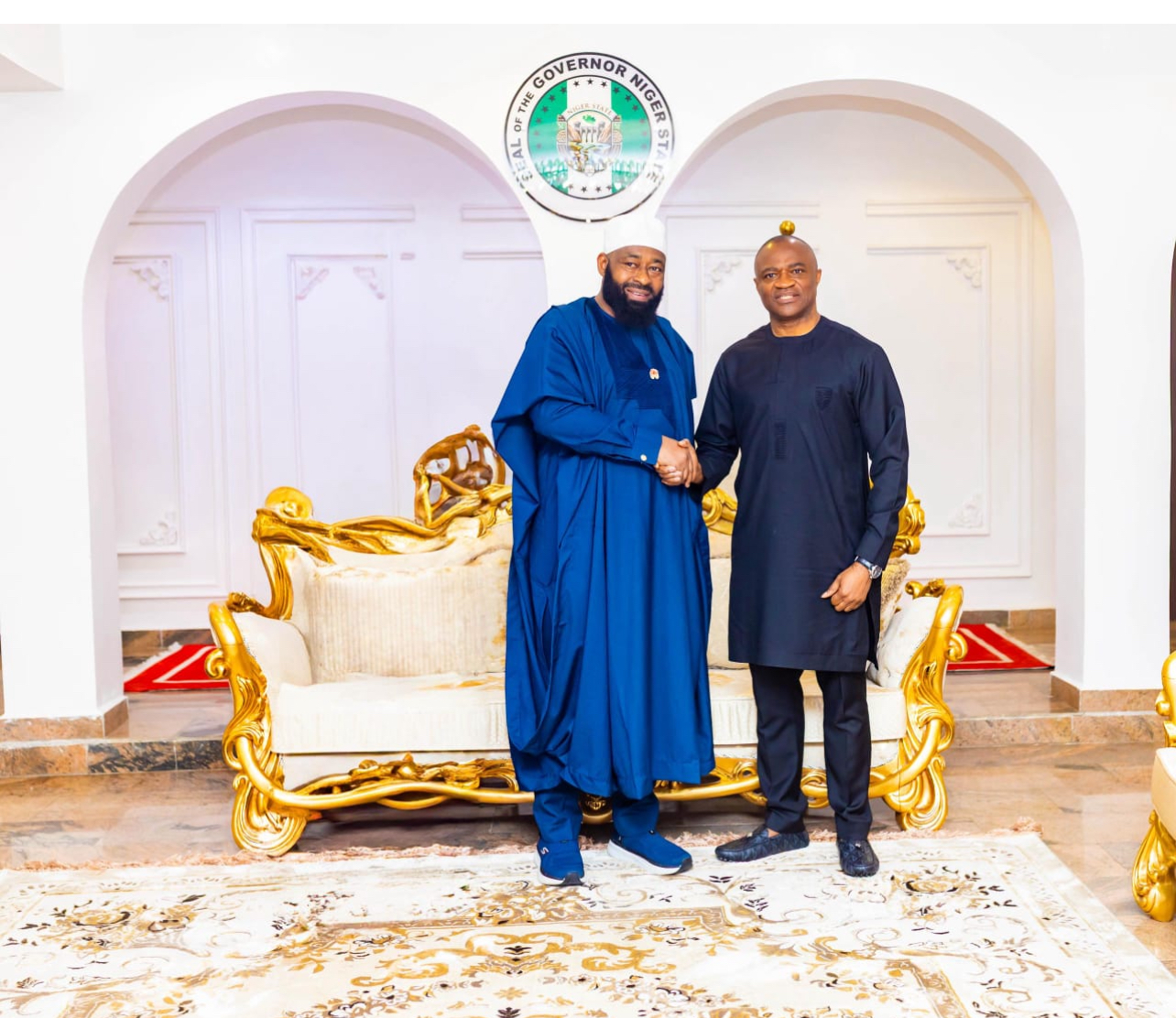
 Pix 1 L-R: Registrar & Chief Executive of the Chartered Institute of Bankers of Nigeria (CIBN) Akin Morakinyo; Managing Director and Chief Executive Officer of Keystone Bank Limited, Mr. Hassan Imam; Group Managing Director/Chief Executive, Zenith Bank, Dame (Dr.) Adaora Umeoji; The Executive Governor of Niger State, His Excellency, Governor Mohammed Umaru Bago; Chairman, Body of Bank CEOs and Group Managing Director/CEO, United Bank for Africa (UBA) Plc, Oliver Alawuba; Managing Director Taj Bank Mr. Hamid Joda; and Secretary to the Government of Niger State (SSG), Alhaji Abubakar Usman during the donation of relief materials from the Body of Bank CEOs in Nigeria, aimed at supporting victims of the recent devastating floods in Mokwa Local Government Area held at the Niger State House in Abuja at the weekend.
Pix 1 L-R: Registrar & Chief Executive of the Chartered Institute of Bankers of Nigeria (CIBN) Akin Morakinyo; Managing Director and Chief Executive Officer of Keystone Bank Limited, Mr. Hassan Imam; Group Managing Director/Chief Executive, Zenith Bank, Dame (Dr.) Adaora Umeoji; The Executive Governor of Niger State, His Excellency, Governor Mohammed Umaru Bago; Chairman, Body of Bank CEOs and Group Managing Director/CEO, United Bank for Africa (UBA) Plc, Oliver Alawuba; Managing Director Taj Bank Mr. Hamid Joda; and Secretary to the Government of Niger State (SSG), Alhaji Abubakar Usman during the donation of relief materials from the Body of Bank CEOs in Nigeria, aimed at supporting victims of the recent devastating floods in Mokwa Local Government Area held at the Niger State House in Abuja at the weekend.
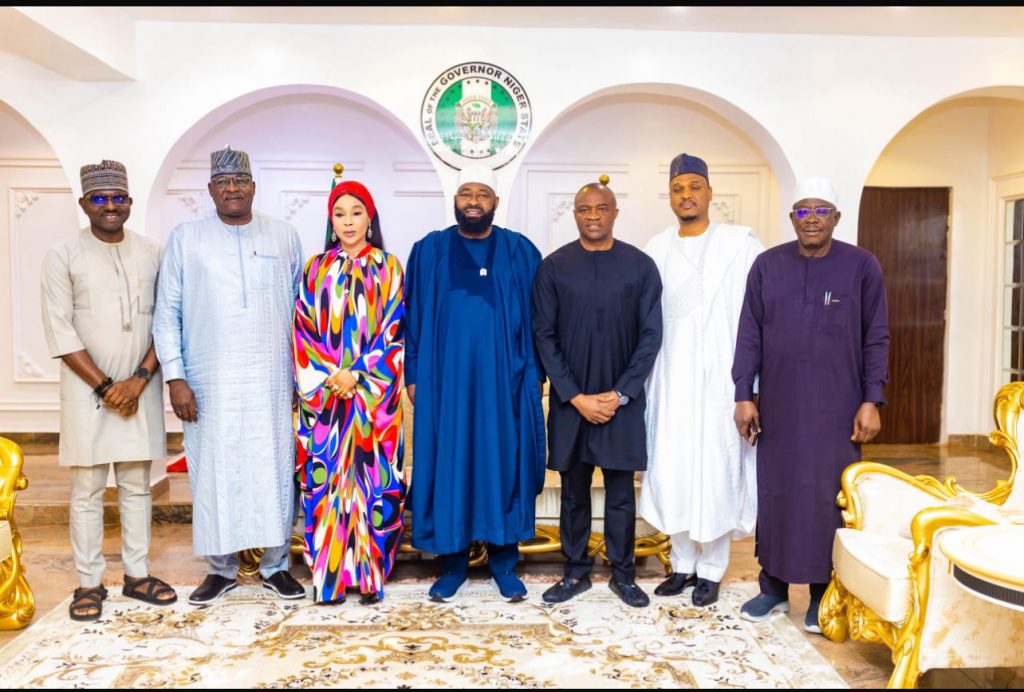 The Executive Governor of Niger State, His Excellency, Governor Mohammed Umaru Bago; Chairman, Body of Bank CEOs and Group Managing Director/CEO, United Bank for Africa (UBA) Plc, Oliver Alawuba during the donation of relief materials from the Body of Bank CEOs in Nigeria, aimed at supporting victims of the recent devastating floods in Mokwa Local Government Area held at the Niger State House in Abuja at the weekend
The Executive Governor of Niger State, His Excellency, Governor Mohammed Umaru Bago; Chairman, Body of Bank CEOs and Group Managing Director/CEO, United Bank for Africa (UBA) Plc, Oliver Alawuba during the donation of relief materials from the Body of Bank CEOs in Nigeria, aimed at supporting victims of the recent devastating floods in Mokwa Local Government Area held at the Niger State House in Abuja at the weekend
Pix 3: L-R: Managing Director and Chief Executive Officer of Keystone Bank Limited, Mr. Hassan Imam; Group Managing Director/Chief Executive, Zenith Bank, Dame (Dr.) Adaora Umeoji; The Executive Governor of Niger State, His Excellency, Governor Mohammed Umaru Bago; Chairman, Body of Bank CEOs and Group Managing Director/CEO, United Bank for Africa (UBA) Plc, Oliver Alawuba; and Managing Director Taj Bank Mr. Hamid Joda, during the donation of relief materials from the Body of Bank CEOs in Nigeria, aimed at supporting victims of the recent devastating floods in Mokwa Local Government Area held at the Niger State House in Abuja at the weekend.
In a heartwarming display of corporate social responsibility and solidarity, a consortium of Nigerian Bank CEOs, has pledged significant support to alleviate the suffering of flood victims in Niger State
The Executive Governor of Niger State, His Excellency, Governor Mohammed Umaru Bago on Saturday in Abuja received relief materials from the Body of Bank CEOs led by its Chairman, Mr Oliver Alawuba.
The gesture is aimed at supporting victims of the recent devastating floods in Mokwa Local Government Area of the state.
Oliver Alawuba who is also the Group Managing Director/CEO of United Bank for Africa(UBA), led the delegation to the Niger State Government house Abuja, where they presented essential relief items, including bags of rice, beverages, vegetable oil, and mattresses, valued at millions of naira.
The devastating floods, which have affected thousands of families in the region, have prompted the banking community to come together in a show of empathy and support to those displaced and affected by the disaster.
In his address, Alawuba expressed the banking industry’s deep sympathy for the affected communities and reaffirmed their dedication to sustainable support while pointing out that the gesture underscores the banking sector’s commitment to corporate social responsibility and humanitarian intervention especially in times of crisis.
He said, “Today, we stand with the people of Niger State in their time of need. We want you to know that we feel your pain and we give you our firm resolve to assist in rebuilding lives. This donation is just the beginning; we pledge continued collaboration with the Niger State Government to ensure long-term recovery and resilience.”
Other top CEOs and executives at the presentation included by the Group Managing Director/Chief Executive of Zenith Bank, Dame (Dr.) Adaora Umeoji, the Registrar and Chief Executive of the Chartered Institute of Bankers of Nigeria (CIBN), Mr. Akin Morakinyo, Managing Director and Chief Executive Officer of Keystone Bank Limited, Mr. Hassan Imam; Managing Director Taj Bank Mr. Hamid Joda; Secretary to the Government of Niger State (SSG), Alhaji Abubakar Usman senior government officials, banking executives, and media representatives, marking a significant step in public-private collaboration for humanitarian relief.
Governor Bago, who received the relief materials on behalf of the state, commending the banking sector for its timely intervention.
“This gesture reinforces the critical role of private-sector partnerships in disaster response,” Governor Bago stated. “We are grateful for this support and look forward to deeper collaboration in safeguarding our communities against future challenges. On behalf of the good people of Niger State, particularly the affected families in Mokwa, I extend our sincerest thanks for this timely and compassionate intervention,” Bago stated.
“The recent floods in the state brought immense hardship to the people, displacing families, destroying livelihoods, and disrupting communities and the banking sector, under the leadership of Alawuba and his esteemed colleagues, has demonstrated that beyond financial stewardship, they are true partners in national development and humanitarian service.
This donation is not just about the physical items; it is a symbol of hope, resilience, and the unwavering support of Nigeria’s financial institutions in times of need. It reassures our people that they are not forgotten, the governor stated.
…
brand
FirstBank Wins Gold for Best Corporate University in Social & Climate Change Impact

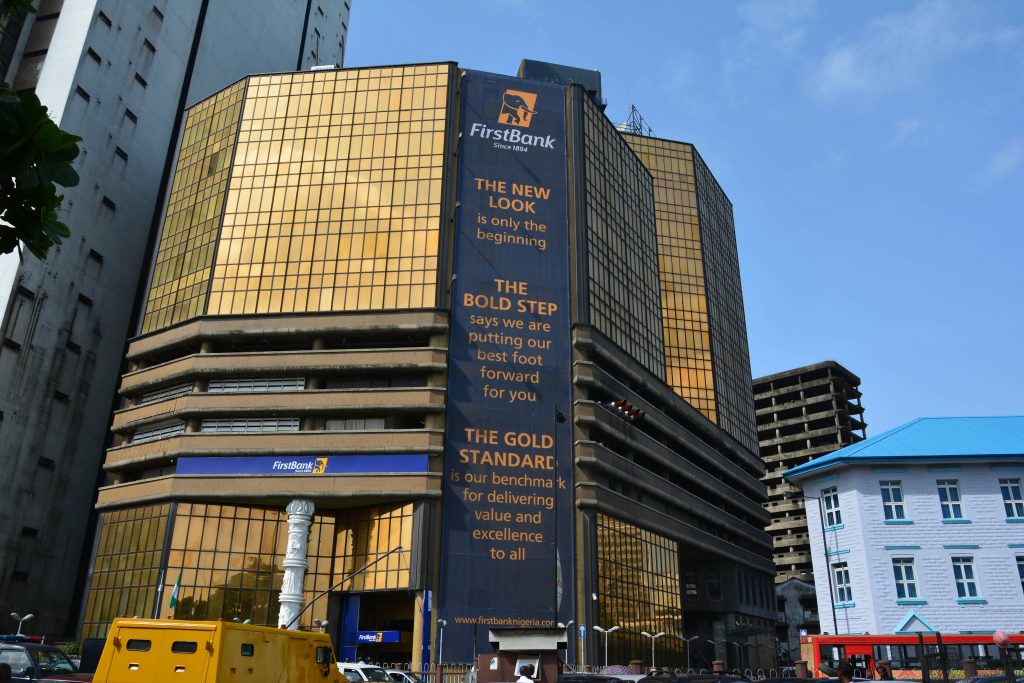 FirstBank, the West Africa premier bank and financial inclusion services provider, is thrilled to announce that its Corporate University, FirstAcademy, has been awarded the Gold Award for Best Corporate University in Social & Climate Change at the Global Council of Corporate Universities (GlobalCCU) Awards 2025.
FirstBank, the West Africa premier bank and financial inclusion services provider, is thrilled to announce that its Corporate University, FirstAcademy, has been awarded the Gold Award for Best Corporate University in Social & Climate Change at the Global Council of Corporate Universities (GlobalCCU) Awards 2025.
This highly acclaimed award recognises FirstAcademy’s outstanding commitment to driving social and climate change learning initiatives, aligning its learning and development programs with internal stakeholder needs, and promoting Corporate Social Responsibility (CSR).
The GlobalCCU Awards is a prestigious, biannual recognition of excellence in corporate universities, setting the highest standard for the industry. With a rich 12-year history dating back to its inaugural ceremony in Paris in 2013, the awards have consistently honoured outstanding Corporate Universities, learning and development structures worldwide. The GlobalCCU Awards celebrate institutions that create remarkable value for people, businesses, society and the planet.
FirstBank’s FirstAcademy exemplifies this mission by earning the Gold Award for Best Corporate University in Social & Climate Change at the 2025 ceremony in Paris, France. This distinction reflects FirstAcademy’s dedication to fostering sustainability and environmental responsibility; developing impactful learning initiatives that transcends traditional corporate training, with broader societal goals; integrating climate action into its portfolio and operations; expanding climate finance offerings and developing a climate action capacity building training program.
FirstAcademy was inaugurated in 2012 as the Bank’s designated corporate academy designed to provide structured talent development, knowledge management and culture change initiatives. One major objective of the academy is to equip staff with the requisite knowledge and skills required to deliver on the Bank’s strategic aspirations and to thrive in an ever-evolving work environment while contributing to social and environmental responsibility.
According to the Founder and Chairman of the GlobalCCU Awards, Annick Renaud-Coulon, “FirstAcademy is an outstanding Corporate University that is clearly the Best Corporate University globally for driving social and climate change learning initiatives.”
Congratulating FirstAcademy, the Founder and Chairman of the GlobalCCU Awards, Annick Renaud-Coulon, said “FirstAcademy is a very mature Corporate University which demonstrates a strong alignment with FirstBank’s vision of responsible banking and sustainable development, with clear support from senior leadership and a governance model that strategically connects learning to business priorities. Congratulations to FirstAcademy for setting a visionary standard in advancing meaningful social and climate change impact through learning and inclusive capacity building!”
In the words of Olayinka Ijabiyi, the Acting Group Head, Marketing and Corporate Communications, FirstBank “We are delighted to receive this international recognition for our efforts in promoting social responsibility and climate action. This award serves as a testament to our belief that businesses can be a force for good, driving transformation that extends beyond profit to create sustainable and equitable futures for all. FirstAcademy’s programs have not only enhanced employee skills but also contributed to the well-being of society and the environment.”
As FirstBank’s FirstAcademy continues to bridge the gap between corporate initiatives and community needs, it sets a leading example for corporate universities around the globe, inspiring others to follow suit in the quest for meaningful change.
brand
Access Holdings Topsin Asset Qualityin Proshare’s 2025Tier1 Banking Rankings
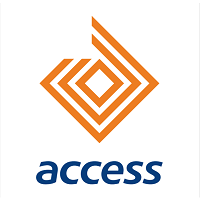

Access Holdings PLC has been ranked the Tier 1 bank
-
www.accessbankplc.comAccessHoldingsdemonstratedstrongfundamentalsacrossalltheseparameters.Itclosed Full Year 2024 with total assets of 41.5 trillion and a loan book of 13.1 trillion.₦ ₦The Group’scapitaladequacyratiostoodat20.46percent,whileassetgrowthfortheperiodreached55.49percent.Itscostofriskwasheldat1.25percent,netinterestmargin recorded at 6.80 percent, and earnings growth was an impressive 88.05 percent,all indicators of a business built on financial soundness and execution excellence.Speaking at the launch event, Olufemi Awoyemi, Chairman of Proshare, described thereport as a vital mirror into the shifting dynamics of Nigeria’s financial services industry.“AccessHoldingshasprovenitselfasastrong,adaptiveinstitution.Itsrobustcapitalbase, successful fundraising, and continental expansion efforts show a group that is notonlygrowingbutevolving.Asrecapitalisationreshapesthebankinglandscape,institutions like Access Holdings will continue to define the future of finance in Africa.”He further remarked on the nuance behind E
-

 news5 years ago
news5 years agoUPDATE: #ENDSARS: CCTV footage of Lekki shootings intact – Says Sanwo – Olu
-

 news2 years ago
news2 years agoEnvironmental Pollutions : OGONI COMMUNITY CRIES OUT, THREATENS TO SHUT DOWN FIRSTBANK,SHELL OIL COMPANY OPERATIONS FOR NOT PAYING COURT AWARD
-

 lifestyle5 years ago
lifestyle5 years agoFormer Miss World: Mixed reactions trail Agbani Darego’s looks
-

 health4 years ago
health4 years agoChairman Agege LG, Ganiyu Egunjobi Receives Covid-19 Vaccines
-

 politics2 months ago
politics2 months agoBreaking : Oborevwori , Okowa others dumps PDP, defects to APC
-

 lifestyle4 years ago
lifestyle4 years agoObateru: Celebrating a Quintessential PR Man at 60
-

 news1 month ago
news1 month agoBREAKING: Tinubu swears in new NNPCL Board
-

 health5 years ago
health5 years agoUPDATE : Nigeria Records 790 new cases of COVID-19


